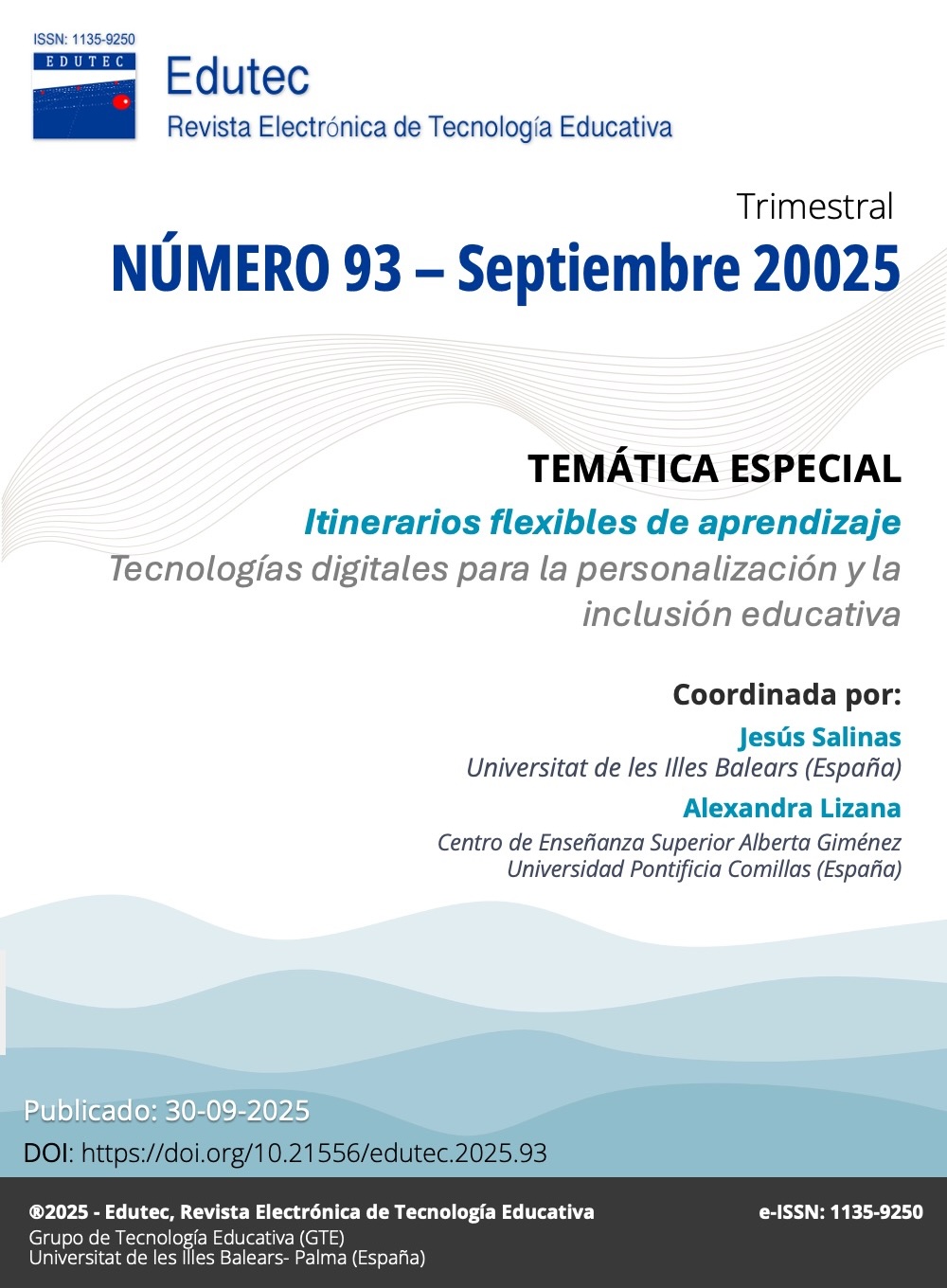Tripulantes: a transmedia experience to personalize learning, strengthen agency, and promote mental health in rural school settings
DOI:
https://doi.org/10.21556/edutec.2025.93.4053Keywords:
Transmedia stortelling, personalized learning, agency, mental health, inclusive education.Abstract
"Tripulantes" is a research-creation project developed between 2023 and 2024 at the Institución Educativa San Fernando in Amagá (Antioquia, Colombia) with ninth-grade students. The objective was to analyze the impact of transmedia narratives on promoting more equitable and inclusive education in a rural school context. The qualitative study was based on a phenomenological perspective and social semiotics. It was structured in five phases: diagnosis, design, implementation, analysis of findings, and preparation of the final report. Methodological triangulation was applied by combining various techniques, such as participant observation, workshops, interviews, and semiotic analysis of narrative products created by students. The findings show that active student participation in the educational process fosters agency, promotes personalized learning, and generates new ways of teaching and learning. It is concluded that these types of strategies contribute to the configuration of alternative pedagogical scenarios that promote mental health and commitment to learning.
Funding
POLITECNICO COLOMBIANO JAIME ISAZA CADAVID
Downloads
References
Alonso, E., & Murgia, V. A. (2020). Narrativa transmedia pedagógica: Etapas, contextos y dimensiones para su inclusión en el aula. Propuesta Educativa, (53), 99–112.
Biesta, G. (2015). The beautiful risk of education. Routledge. DOI: https://doi.org/10.4324/9781315635866
Chulde-Zhirve, E. H., Suarez-Flores, V. A., Simbaña-Lincango, A., Chisaguano-Tapia, J. N., & Espinosa-Aguirre, W. E. (2024). Estrategias para implementar la personalización del aprendizaje en aulas activas. Revista Científica Retos de la Ciencia, 1(4), 99–114. DOI: https://doi.org/10.53877/rc.8.19e.202409.9
Díaz, C. (2023). Narrativas transmedia como estrategia pedagógica: Una aproximación a la educación contemporánea. Editorial Académica Española.
Freire, P. (1970). Pedagogía del oprimido. (2a ed.) Siglo XXI Editores.
González-Martínez, J., Pence, H., & Grandío-Pérez, M. (2018). Alfabetización mediática en entornos educativos: Retos y perspectivas. En M. Grandío-Pérez (Ed.), Alfabetización transmedia en la nueva ecología de los medios (pp. 87–114). Gedisa.
González-Martínez, J., Serrat-Sellabona, E., Estebanell-MinGuell, M., Rostan-Sánchez, C., & Esteban-Guitart, M. (2018). Sobre el concepto de alfabetización transmedia en el ámbito educativo. Una revisión de la literatura. Comunicación y Sociedad, (33), 15–40. https://doi.org/10.32870/cys.v0i33.7029 DOI: https://doi.org/10.32870/cys.v0i33.7029
Hernández Sampieri, R., Fernández Collado, C., & Baptista Lucio, P. (2023).
Metodología de la investigación: Las rutas cuantitativa, cualitativa y mixta (2a ed.).
McGraw-Hill.
Irigaray, R. (2024). Transmedialidad como espacio de diálogo y construcción colectiva [Ponencia]. Seminario Internacional sobre Narrativas Transmedia, Universidad Nacional de Rosario, Argentina.
Jenkins, H. (2006). Convergence culture: Where old and new media collide. NYU Press.
Jenkins, H. (2015). Cultura transmedia. La creación de contenido y valor en una cultura en red. Gedisa.
Lugo Rodríguez, N. (2016). Diseño de narrativas transmedia para la transalfabetización [Tesis doctoral, Universitat Pompeu Fabra]. http://hdl.handle.net/10803/396131
Mateus, J. C. (2021). Ecología de los medios en la escuela. Telos, 115, 68-73. https://telos.fundaciontelefonica.com/telos-115-cuaderno-un-mundo-en-construccion-ecologia-de-los-medios-en-la-escuela/
Organización Mundial de la Salud. (2021). Mental health of adolescents. https://www.who.int/news-room/fact-sheets/detail/adolescent-mental-health
Organización Mundial de la Salud. (2022). Salud mental: Fortalecimiento de nuestra respuesta. https://www.who.int/es/news-room/fact-sheets/detail/mental-health-strengthening-our-response
Rigo, D. Y., Beatriz Squillari, R., Caraballo, M. R., & Rovere, R. (2021). Revisión teórica del concepto agencia. Implicancias educativas para comprender el compromiso académico. Ciencia y Educación, 5(2), 81–92. https://doi.org/10.22206/cyed.2021.v5i2.pp81-92 DOI: https://doi.org/10.22206/cyed.2021.v5i2.pp81-92
Sapiens Labs. (2024). The Mental State of the World Report 2024. https://www.sapienlabs.org/reports
Scolari, C. (2013). Narrativas transmedia: Cuando todos los medios cuentan. Deusto.
Scolari, C. (2016). Alfabetismo transmedia: Estrategias para la educación mediática. Gedisa.
Scolari, C. (2018). Las narrativas transmedia: Cuando todos los medios cuentan. Deusto.
Scolari, C. A., Ardèvol, E., Pérez-Latorre, Ò., Masanet, M. J., & Rodríguez, N. L. (2020). What are teens doing with media? An ethnographic approach for identifying transmedia skills and informal learning strategies. Digital Education Review, (37), 269–287. DOI: https://doi.org/10.1344/der.2020.37.269-287
Solorzano, M. (2023). Investigación-creación en contextos educativos: Metodologías emergentes. Editorial Universitaria.
UNESCO. (2017). Educación 2030: Marco de acción para la implementación del ODS 4. https://unesdoc.unesco.org/ark:/48223/pf0000245656
Varona Klioukina, S., & Engel, A. (2024). Prácticas de personalización del aprendizaje mediadas por las tecnologías digitales: Una revisión sistemática. Edutec, Revista Electrónica De Tecnología Educativa, (87), 236–250. https://doi.org/10.21556/edutec.2024.87.3019 DOI: https://doi.org/10.21556/edutec.2024.87.3019
White, M., & Epston, D. (1990). Narrative means to therapeutic ends. Norton & Company.
Published
How to Cite
Issue
Section
License
Copyright (c) 2025 Edutec, Revista Electrónica de Tecnología Educativa

This work is licensed under a Creative Commons Attribution 4.0 International License.
By submitting the paper, the authors assign the publication rights to the journal Edutec. For its part, Edutec authorises its distribution as long as its content is not altered and its origin is indicated. At the end of each article published in Edutec, the citation procedure is indicated.
The management and editorial board of Edutec Revista Electrónica de Tecnología Educativa do not accept any responsibility for the statements and ideas expressed by the authors in their work.
Translated with www.DeepL.com/Translator (free version)









